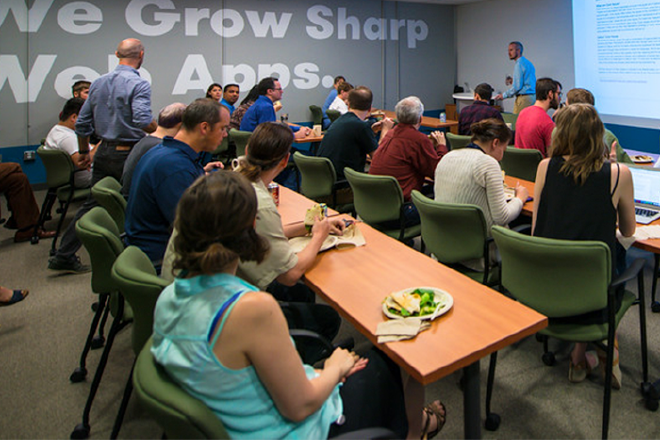Go to any major city and you will be able to find a user group for just about every major, modern programming language. Developers meet in their off hours to discuss what’s new in their language of choice, challenges they’ve encountered, and different ways of doing things. If you’ve never been to one of these groups, it might be easy to brush them off as an unimportant outlet where people talk in way too much detail about a geeky interest. Instead, most of the attendees are professionals who are looking to build skills and find new ways to solve problems.
Why do we sacrifice our personal time to discuss the things we do all day at work? Simply put, it makes us better programmers. When I attend a meetup or talk, even on topics which only have a small overlap with the code I write on a day-to-day basis, I always learn something new. I don’t need to jot it down or record it; I wouldn’t ever think to go back and reference those notes anyway. But weeks, months, or sometimes even years later, when I come across a hurdle which requires a creative solution, something may nag me from the back of my mind. “Remember you once heard a talk about _?” it asks. “Maybe a solution like that one would help here?” To Google I go, with a topic in mind that gives me a jumping-off point.
Having diverse little nuggets floating around in the recesses of my memory gives me a large bank of ideas to draw from when I need a solution I may not have used before. The memory may not even be directly applicable, but you’d be surprised how often there are parallel solutions in wildly different areas. These ideas don’t always pan out, but they get me past that coder’s block often enough to be very much worth the investment of my time.
Besides the benefits for an individual coder though, user groups for a programming language or industry can help the broader community of developers in a number of ways. Most transparently, these groups provide an obvious place for a new developer to meet people, learn more about their language(s) of choice, and get advice on how to gain the necessary skills to accomplish their goals. But there’s a much more subtle benefit going on here as well. By attending these groups and interacting with people who may not otherwise cross paths, even the most experienced coders can have their rigid ideas challenged and break out of restrictive thinking.
Every workplace settles into a culture, in which certain ideas and techniques are considered to be “best practices,” often for very good reason. It is all too easy for these best practices to get calcified into “the way we’ve always done things,” and we all have stories about the perils of that line of thought. Developer communities, by providing a platform for developers to interact with a diversity of people and in less-structured contexts, allow them to break out of their workplace culture and have those ideas challenged. Sometimes, a developer will address the challenge and come out even more certain that their preferred methodology is really best, and other times they’ll come out thinking that there may be cases in which a different approach is a better solution. But no matter what, they will have had an opportunity to think through a practice that they’ve been executing for months or years without examining.
On occasion, revolutionary ideas come out of these groups, and gradually percolate through wider communities, but every single meeting contains a benefit for someone present. For these reasons and more, Caktus is proud to offer a space for these groups to meet, and to support the wider community. By welcoming discussion and learning into our Tech Space, we hope to encourage growth in individuals and the community, and challenge some of our own calcified ideas while we’re at it.
